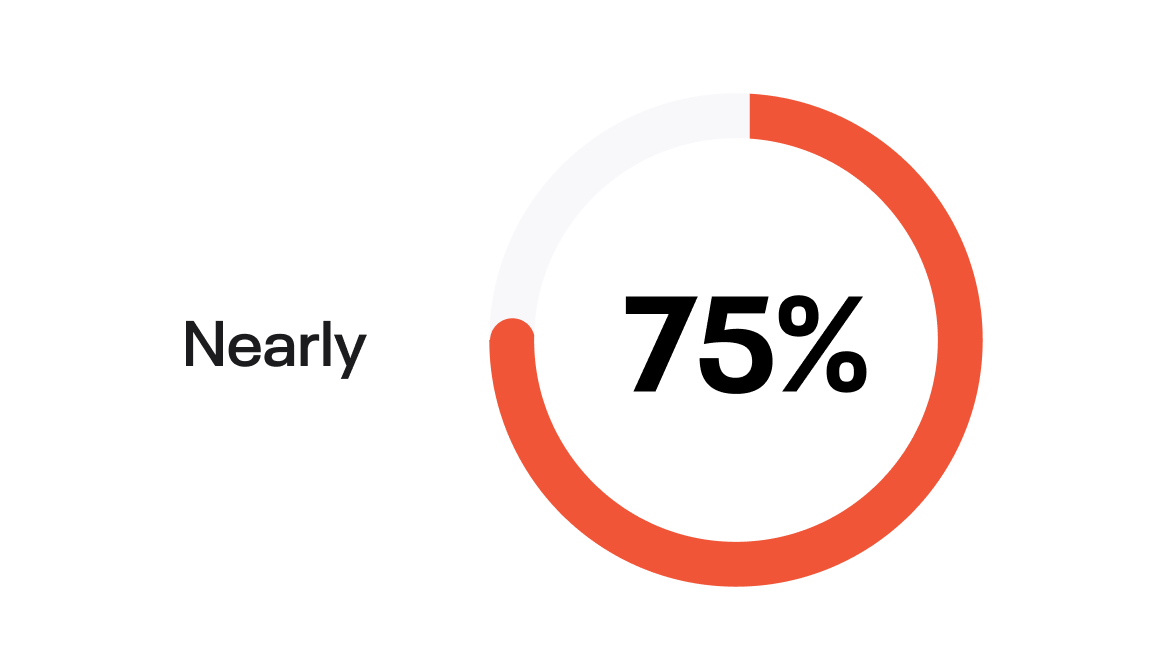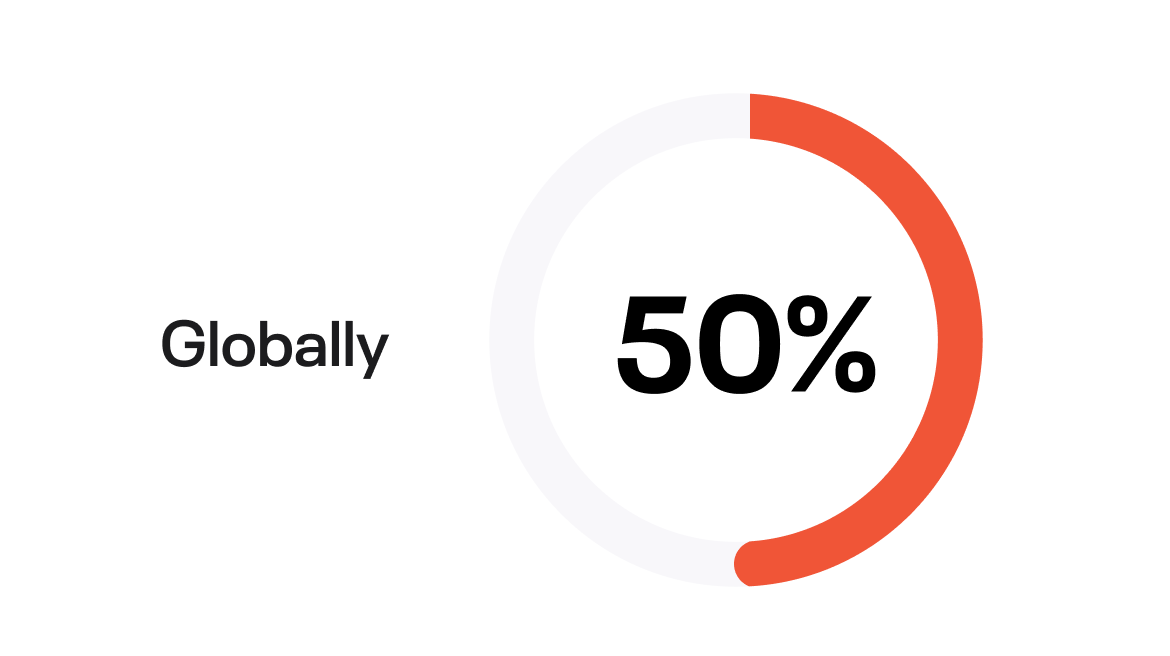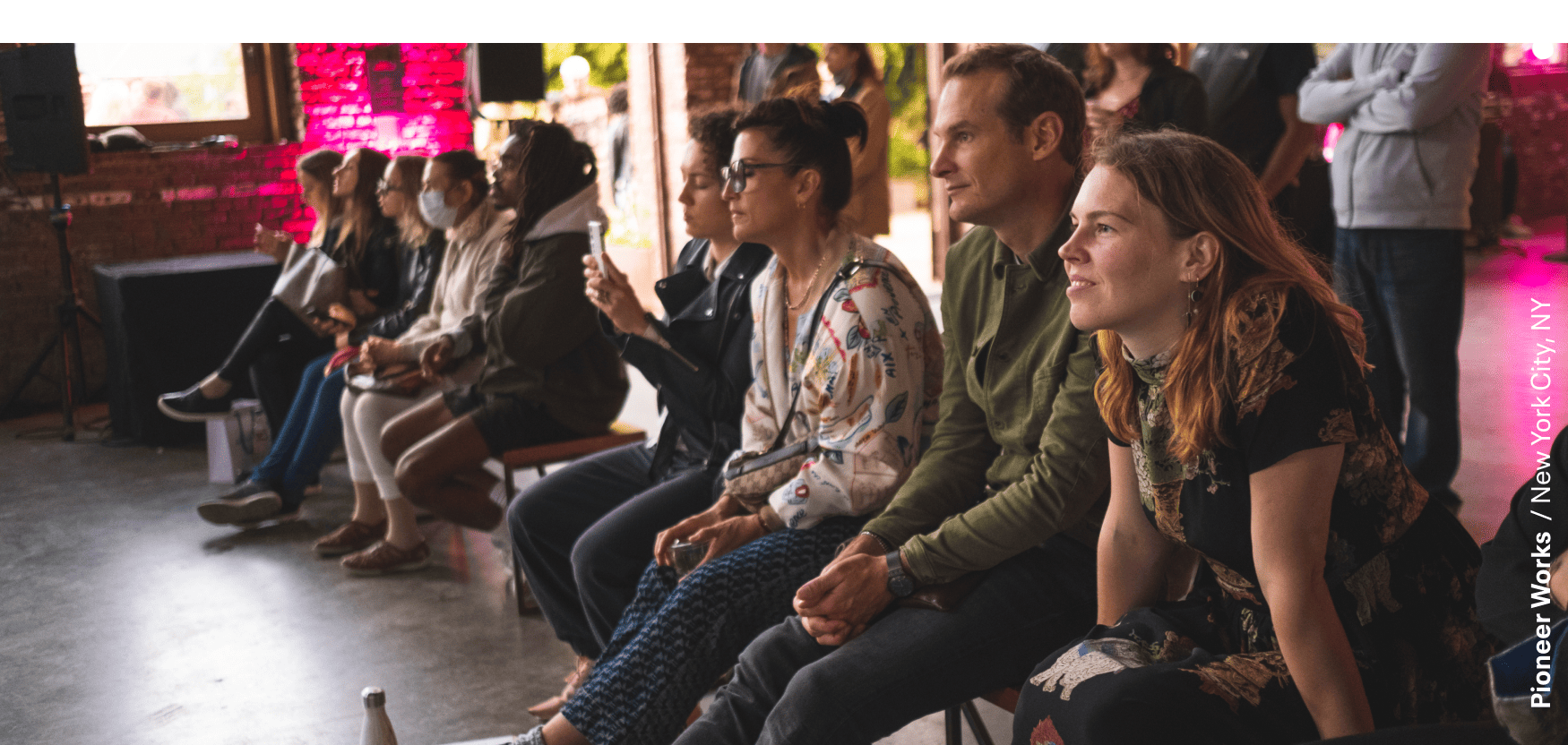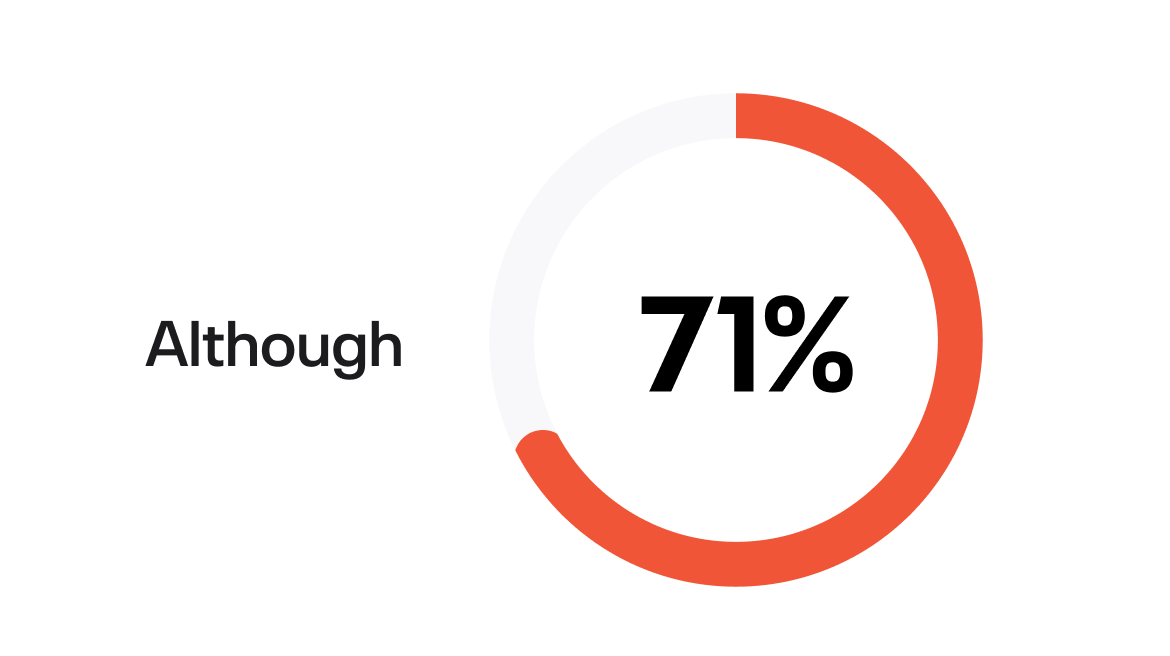The 2022
Call it Bold
but after two years of global lockdowns and mandated distancing — which made gathering together exceptionally difficult — event creators are feeling rosy about the future.
At the end of 2021, we ran a survey across the US, UK, Ireland, Australia, and New Zealand to learn how event organizers are feeling about the year ahead. Over 4,500 respondents answered our questions, revealing how the pandemic and its aftermath will influence their event planning going forward.
So, back to that rosy outlook …
Event organizers are feeling optimistic about 2022

of global survey respondents say they’re either very or somewhat optimistic about hosting events this year. Their hopefulness is driven by an overwhelming sense that the rest of the world is eager to gather in person again.
“I feel most optimistic when I think of reconnecting with my event attendees. Over the time I was shut down during the pandemic, I stayed connected with my students over social media and email. We shared our struggles and our life changes,” says Jackie Kowalik, owner of Yoga Jawn in San Diego, CA.
“When I announced that I was bringing my classes back, I was able to fill my first two months of classes in under 30 minutes,” says Kowalik.
“I couldn’t believe it. We all learned very quickly in March 2020 how valuable our connections to the community can be for our lives. We all just want to get together again and regain a sense of connectedness.”
Jackie Kowalik, owner of Yoga Jawn in San Diego, CA.
The reemergence of popular in-person events seems to confirm this feeling, from sold-out upcoming festivals to heavily attended seasonal and cultural celebrations around the world. Other trends also offer affirmation. A report issued by the Center for Exhibition Industry Research showed that cancellation rates at exhibition events went from 98% in 2020 to less than 20% in 2021.
Perhaps no place is more eager to bring people together again than Ireland, which experienced some of the strictest COVID-19 regulations out of the surveyed countries. Nearly nine out of 10 respondents in that region reported that they felt attendees were enthusiastic to meet in person again.
As one organizer says:
“While virtual events have helped us get through this tough time, it will be nice to finally see people face-to-face again. The atmosphere of an in-person event cannot be duplicated virtually.”
Organizers’ optimism is partly born out of the belief that the pandemic is finally, truly (this time for real) winding down. Variants like Delta and Omicron threw a wrench in earlier trend reports that predicted the same, but with Omicron’s milder effects, vaccination rates ticking upward, and better medications to treat COVID-19, there’s a brightening light at the end of the tunnel.
“Throw on a mask, throw on a hazmat suit, do whatever you have to do, but by any means necessary, please get out of the house.”
Xavier Henderson, Co-Founder of SoulfulofNoise in Upland, CA.
There is strength in (diverse) communities
Nearly three out of four of respondents feel closer to their audience than before, and some 50% of organizers are planning events that will help foster community in the new year.
“I’m looking forward to creating curated, inclusive events that focus on people and the community. I think people want to celebrate and live more now than before, so events that help people celebrate, nurture, and grow are high on our list,”
says one organizer.
“We’ve always worked to create a space that felt like a family reunion, and this pandemic truly showed us how valuable that is. Our audience is our family, and we miss them the same way we miss our relatives whom this pandemic has isolated us from,” says Henderson.
But “community” means more than it did before the pandemic.
Virtual events brought in new audiences from broader age and ethnic groups, from different geographic regions, and included the differently abled who found online attendance more accessible.
Conversations sparked by the Black Lives Matter protests during the summer of 2020 may have also encouraged organizers to reassess how welcoming their events are to those outside their usual audience.
Attendees are hoping these folks stick around even when events return to in-person.
“In 2020 and 2021, we grew our audience online from our live streams and from radio play. We are excited to translate that audience to live events, merchandise, and ticket sales in 2022,” says a respondent.
Another organizer says they are looking forward to “reaching out to rural communities with our concerts, and making connections with care homes using technology to assist us in tailor-making musical resources, such as individual playlists.”

of organizers say that continuing to bring in diverse audiences is a priority in the new year.
Many organizers are also interested in diversifying whom they hire as entertainers and presenters, particularly in the United States where one in three cite this as a priority.
“At Grace Cathedral, we’re also listening deeply and learning to offer more-inclusive, more-meaningful experiences — in person and online — and we’ve themed 2022 the ‘Year of Connection.’ Community has never been more essential to the human spirit.”
Katherine Thompson, Chief Development & Communications Officer of Grace Cathedral in San Francisco, CA.
Despite overall optimism, uncertainty persists
All this enthusiasm for the future doesn’t mean event creators are entirely blind to the challenges ahead, however. Some 20% of respondents express fears over a resurgence in COVID-19 cases.
This anxiety was particularly pronounced in Ireland, with 40% of organizers indicating concern. An uptick in Ireland’s virus transmission rates in December 2021 had public health officials cutting capacity levels in half at indoor events. In an Irish Times article, the lead singer of the band Ham Sandwich called the decision an “absolute nightmare” logistically for anyone with a sold out show.
In Australia, “planning for next year” was even more of a concern than COVID safety worries, with nearly one-fourth of organizers citing this as their primary worry. This is likely tied to a wave of event cancellations in December 2021 as the Omicron variant tore through the country.
However, while uncertainty lingers globally, there are strong signs we’re emerging from restrictions to gathering — New Orleans’ annual Mardi Gras celebrations will once again draw millions to the city in March; England’s Cambridge Folk Festival, one of the longest-running folk festivals in the world, is back on for this summer; and, after going virtual in 2021, Australia’s Melbourne International Film Festival will be in person starting in July.

So, with a return to gathering firmly on the agenda this year, how are those pre-event jitters? Nearly one in four of survey respondents say they are concerned about low levels of attendance this year, and ticket sales reflect this worry. Among those who sell tickets, 50% of respondents reported that sales volume is down compared to pre-pandemic levels.
But, it’s not all bad news. Another 26% say their sales have increased, and another 24% report sales are on par with levels before the pandemic.
This bodes well for future revenue, as it’s traditionally more difficult to raise ticket prices once they’ve been lowered. As events power back up over the next year, organizers should be able to count on a return to more-normal income levels. Need help pricing your events? Check out our ticket pricing guide.
Safety remains a concern, but with differing strategies by country
The pandemic has generated unprecedented concern for safety at gatherings, which means organizers are enforcing measures to curtail virus transmission. Globally,



were the three most-popular tactics for enforcing safety at events.
With more positive signs of a return to normal on the horizon, we must not forget the ways in which event creators pivoted when times were tough – interestingly, strategies differed significantly across regions.
In Australia and New Zealand, contact tracing played an important role for 47% of respondents. In the United States, just 11% said they used contact tracing. Almost 3 in 4 Canadian respondents asked attendees for proof of vaccination compared to 33% of Americans. Masks were required at 70% of Canadian respondents’ events, while just 35% of Australian organizers surveyed required them at their events.
Such disparate strategies reflect the considerable difference in public health responses, both between regions and within countries themselves.
One important safety precaution for event planners has been asking for proof of vaccination.
The most popular strategy, globally, is asking for proof at the door, with 68% of respondents stating they confirm vaccination that way.
In the United States, however, 43% of American respondents are collecting this information before the event begins, compared to the other regions surveyed who answered in the range of 23%-32%. Approximately 30% of respondents are using a third-party app to verify vaccination status.
Confirming vaccination status can be a challenge for organizers. Asking for proof upfront requires additional planning or software, while asking at the door can generate long lines. This will likely continue to be a pressure point for organizers through 2022. Curious to learn from your fellow event organizers? See how three Eventbrite organizers are handling proof of vaccination at their events.
You can check out Eventbrite’s guide to keeping your event COVID-19 safe here.
Virtual events remain part of the plan
Virtual events were the standout trend of the past two pandemic years, with 46% of organizers stating they organized their first virtual event during 2020. Ireland takes the prize for most pivoters to online hosting: 64% of respondents from the country stated they hosted their first during the pandemic.
Online-only events aren’t going to dominate indefinitely, however.

of global respondents indicated they had conducted virtual events in 2021, only 49% planned to host them in 2022.
Respondents sense their attendees are eager to gather in person, an instinct backed up by the fact that many people are experiencing “Zoom fatigue.” A survey of 1,700 employees by the remote work consultancy Virtira found that nearly 50% reported exhaustion due to webcam meetings.
With COVID-19 uncertainty still in the air, hybrid events will likely be a popular option for 2022. Because these give attendees the option to either attend in person or virtually, they can help assuage safety concerns and retain the diverse audiences that organizers value. Those outside the geographic area or restricted by health issues can still partake in the fun while others can finally meet up face-to-face.
“Historic preservation takes a crowd, and our online festival on Eventbrite reached an international audience for the first time. We are moving toward hybrid programming to keep our international community engaged while getting back to the streets for history walking tours.”
Randall and Al of SF Neon in San Francisco, CA.
Just under 35% of survey respondents reported experience organizing a hybrid event, but nearly 50% were planning to host one in 2022.
One respondent says they were planning to,
“continue to build large online events and experiment with new platforms and ways to make these more engaging, [including] how to weave hybrid events successfully [into] the new era.”
Hybrid events pose new challenges (and an additional layer of work) for organizers. Check out our hybrid event technology guide for ideas on how to host a successful one.
Maybe it is easy being green
“Green events” have been a major trend for years. In 2020, Eventbrite asked its audience if they were “taking steps to improve the environmental sustainability of your events” to which the majority responded “yes.”
Has this value weathered the pandemic turmoil? It’s complicated.
In our recent survey, greening events was ranked a lower priority than keeping events safe or profitable. Around 20% of respondents ranked “making events environmentally friendly” as a high priority. The chaos of two years of a pandemic may have forced organizers to prioritize survival over environmental concerns.
However, the emergence of virtual and hybrid events could be doing much of the heavy-lifting of sustainability, without the need for organizers to order compostable dinnerware.
A recent Nature Communications study found that hosting a gathering online reduced an event’s carbon footprint by 94% and its energy use by 90%. Hybrid events, with at least 50% of attendees tuning in virtually, could reduce carbon footprints by two-thirds.
As the return to in-person gatherings continue, greener event strategies like ordering vegetarian catering will likely remain popular. However, it may end up that simply continuing the trend of virtual events could have a bigger overall impact on the environment.
Resilience and creativity reign
Regardless of what the future holds, organizers view their strengthened adaptability as cause for optimism.
Almost half of respondents connected their optimism with the fact that events have become more innovative and creative.
A two-year-long pandemic forced event planners to pivot, adapt, and innovate at unprecedented levels. Events went virtual, outdoors or hybrid, and required strict attention to complex public health rulings.
“Over the pandemic, I have tried more new approaches to programs than I have throughout my whole programming career. Through the trial and error process, I feel like I’ve landed on programs that I never would have tried in the past.”
Christina Daniels, Director of Residences and Classes at Pioneer Works in New York, NY.
Some 50% of respondents believe that events have become more innovative and creative during the pandemic. Australia and New Zealand reported lower numbers than other countries, but they’ve also been able to avoid some of the distancing measures that other nations like Ireland have had to contend with.
Respondents also feel like the pandemic has sped up digital transformation, with 82% agreeing or strongly agreeing with this statement.
Large numbers of respondents tried out hosting online events for the first time during the pandemic, and many plan to conduct hybrid events in the new year.
“By this point we have figured out the virtual logistics, and our hybrid events are becoming better, and smarter,” says a respondent. Another said they were looking forward to “embracing the learnings and best practices from COVID to enhance and improve future events — permanently.”
This digital revolution means that event planners have even more opportunity to connect with and promote to their attendees via email and social media, thanks to internet signups.
Surveying audiences will be important as the pandemic response evolves in the coming year. What attendees wanted in the early days of a pandemic may differ from what they want now, while others might prefer that virtual events stick around long-term.
With all these new crisis-forged skills, respondents are feeling ready for the year ahead.
In most countries, almost half of organizers say the pandemic years have made their team more resilient.
With organizers fueled by the desire to see people in person again, and the hope that the pandemic is entering a much less restrictive stage, events seem poised to make a serious comeback this year.
But, even if another variant emerges, or some other unforeseen bump in the road arises, the past two years of skill-building have made hosts exceptionally flexible. Compared to 2020, organizers have many more ways to host gatherings, a lot of practice pivoting swiftly, and a much thicker skin.
As one survey respondent wrote:
“I’m hoping for the best, but accepting reality and [the] courageous capacity to overcome any challenges that might be presented. Ride the rapids!”
Feeling inspired and ready to host your next event? We’d love to help. Contact our event experts to discuss the specifics of your business and how Eventbrite can help take it to the next level.